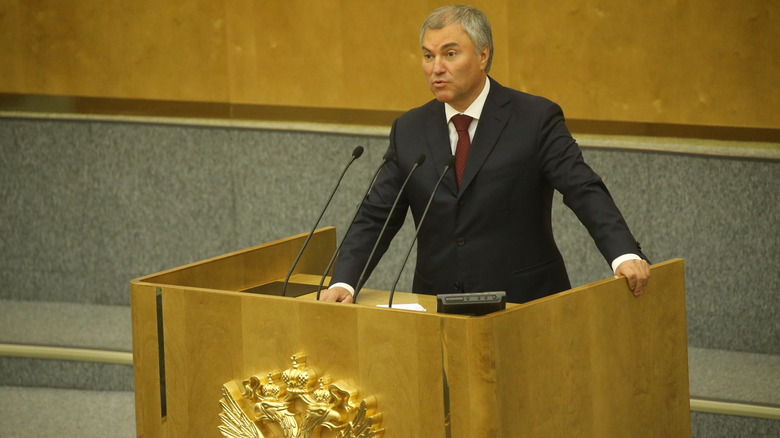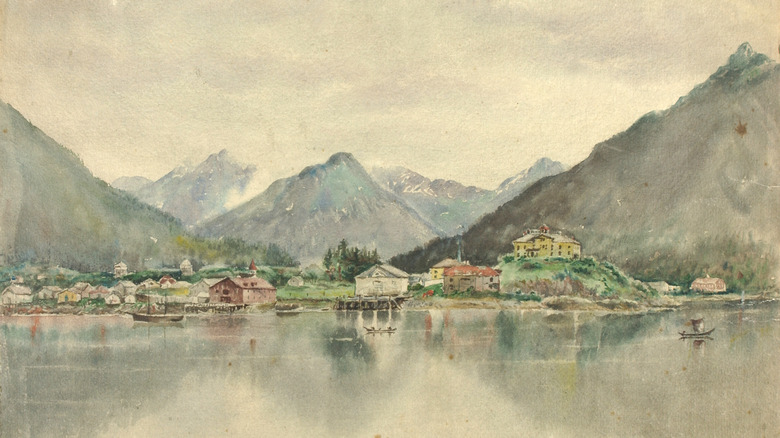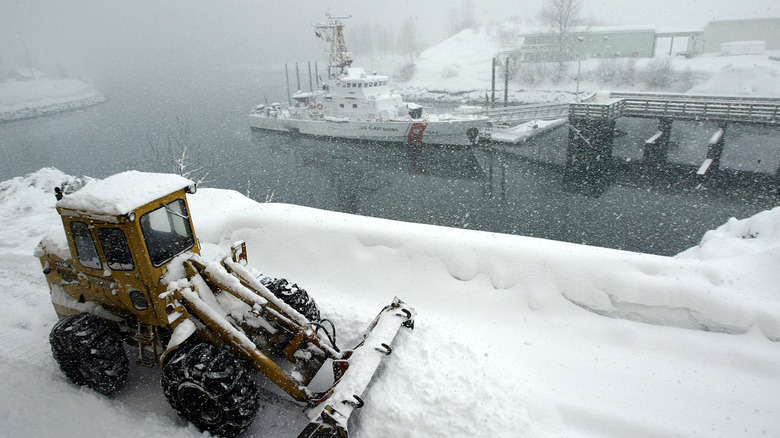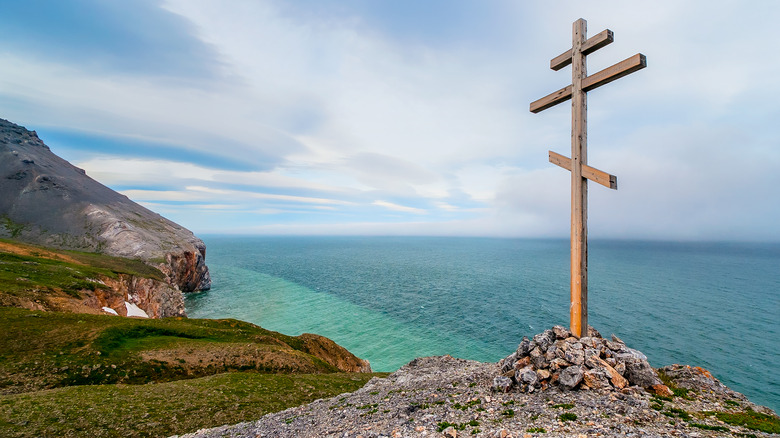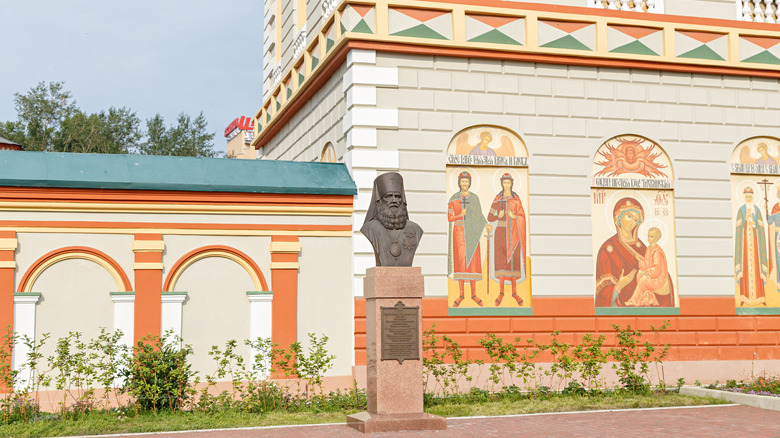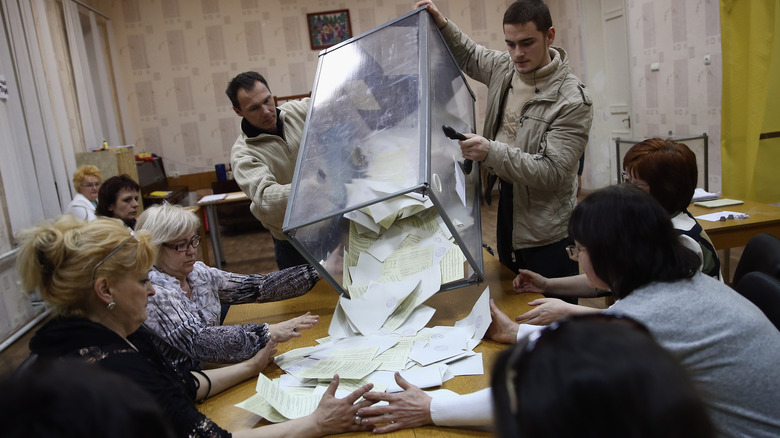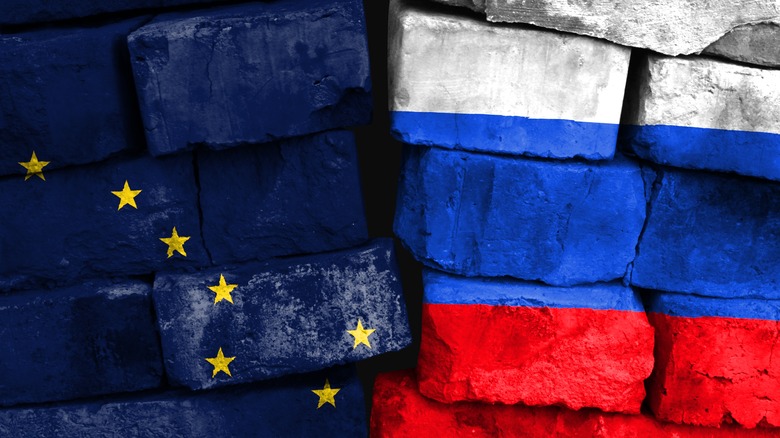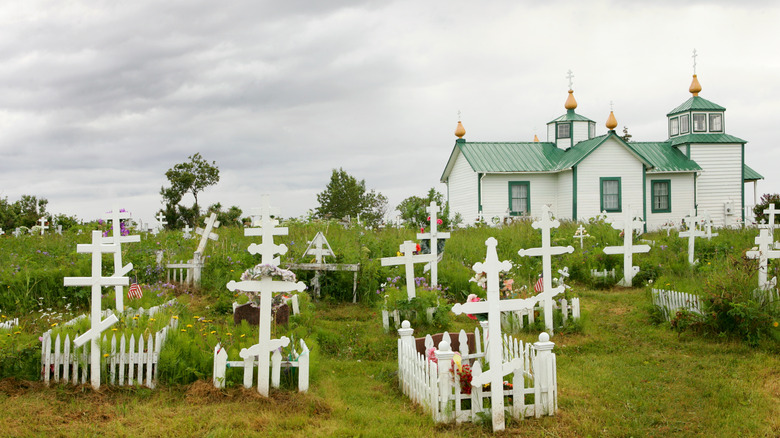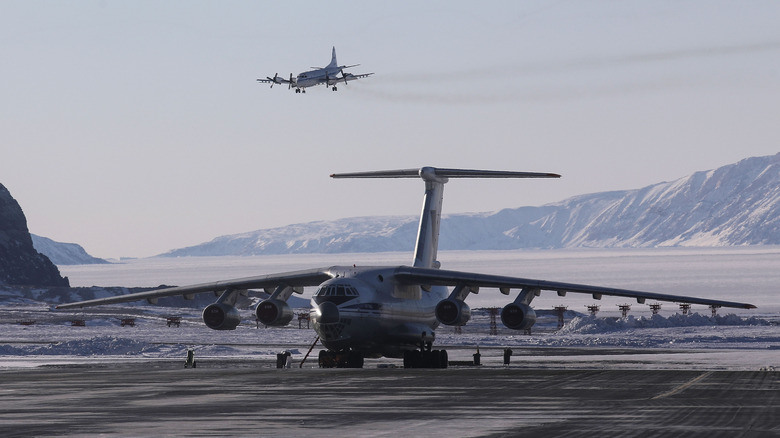What Would Happen If Russia Tried To Take Alaska Back?
Back in March 2022, Fox reported that Duma politician Oleg Matveychev had called for the United States to hand Alaska back to Russia as relations between the two world powers are strained over the war in Ukraine. Since then, billboards in Russian cities (via NDTV) and even Duma speaker Vyacheslav Volodin (above) have echoed the sentiment (via News.ru). Russian rhetoric might seem strange to Americans given that, according to the Library of Congress, the United States purchased Alaska for $7.2 million in 1867 because Russia found that the territory's cost outweighed its value. Americans agreed, dubbing the deal "[Sec. of State William] Seward's Folly" — or in President Andrew Johnson's case, Seward's "polar bear garden." At the time, Russia was the United States' best friend.
Following the 1896 discovery of gold, Alaska, per the Bureau of Ocean Energy Management, has since become a gold mine of natural resources, including the main drivers of the global economy — oil and gas. So, Russia's interest in Alaska probably stems from this. As noted by the German Institute for International Security Affairs, Alaska is also a valuable launchpad for expansion into the Arctic.
Russia's return to Alaska would have significant consequences, not just for Alaskans themselves, but for American national security and energy independence. How would Russia sort out questions of language, identity, culture, and autonomy? How would the United States respond? Here are some possible answers to these questions.
Russian Alaska in brief
Before launching into a potential Russian occupation of Alaska, it is worth discussing what Russia gave up in 1867. According to the Fort Ross Conservancy, Russian fur traders and trappers arrived in Alaska in the 18th century, eventually settling on Kodiak Island. The Russian presence steadily expanded east with the settlements of Novo-Arkhangel'sk (Sitka) all the way down to Fort Ross, California.
Now, despite the Russian claims to Alaska, as noted in Smithsonian Magazine, there were never more than 800 Russians at a time in any of the colonies. It was far removed from Russia's European political and cultural centers, and naturally, few wanted to stay in the harsh Alaskan environment long-term. Those that did (mostly men), per the Fort Ross Conservancy, often intermarried with native women. By the 1850s, the colony was becoming too expensive, so Russia sold it to the United States.
Today, Alaska is a very different place. According to the U.S. Census it has a population of about 733,000. The state mostly speaks English and most importantly, has become an integral part of the United States as evidenced through its statehood. But the state is also part of the global American security strategy, and Washington will be loathe to give up Alaska given the dire economic and strategic consequences that could result.
The Guardian of the North
Russia may seem half a world away for most Americans in the Lower 48. But as Sarah Palin noted in Newsweek, the two countries share an oft-forgotten maritime border on the Bering Sea, making hostilities a matter of concern for the American homeland. Thus, according to the National Park Service, Alaska was called the "Guardian of the North" during the Cold War, which is the lynchpin of American Arctic policy in the modern rivalry with Russia.
According to the U.S. Army's Military Review, Alaska is one of Earth's most strategic locations and full of vital American interests. Alaska is a rich source of natural resources, including oil, gas, coal, fish, and rare earth minerals — all key to the U.S. economy. But it is also important as a base for projecting American power in the Arctic region and in Europe. Alaska sits astride a series of routes called the "Great Circle" routes, which allows the United States to project influence into Asia and Europe. Additionally, the U.S. economy relies upon the Arctic air and sea shipping that passes through these lanes. As Arctic Sea ice redistributes and changes, the U.S. Army believes that the development of a Northwest Passage will make it even more important due to connections with the Atlantic.
So if Alaska were to fall to Russia, the first line of American defense, including the early ballistic missile defense systems, fall too. The loss of natural resources furthermore will force the United States to re-evaluate its sources of certain raw materials — particularly oil and natural gas, whose prices have skyrocketed since 2021 (via CBS).
The United States will lose its biggest energy reserves
Alaska is an energy gold mine. Although the Biden Administration, per Reuters, reversed Trump-era policies to open Alaska to increased energy exploration, high prices have forced the White House to re-open the possibility of Alaska drilling, per Alaska PBS. The state has historically been an important oil producer, although according to the United States Energy Information Administration, production has declined to 4% of the U.S. total, but the state has enormous untapped potential that Russia has taken notice of and the United States likely cannot afford to lose.
Alaska has the biggest oil reserves in the United States. According to the Bureau of Ocean Energy Management, the state has at least 24 billion barrels locked away in offshore deposits alongside over 70 billion barrels from the onshore reserves. The American Gas Association, meanwhile, notes that there also 250 trillion cubic feet of natural gas, which by itself could meet U.S. gas needs for a decade. This is alongside at least 126 trillion cubic feet of offshore gas.
So while the United States has not currently tapped the full potential of Alaskan oil, it would be foolish to simply give it up. Analysts at non-partisan tracker Oil Price have argued that Russia will only truly regret the sale of Alaska once the state's energy potential is fully tapped — suggesting that America will become not just energy-independent again, but a massive powerhouse at Russia's expense. Should Russia take over Alaska again, American energy ambitions would take a massive blow while strengthening Russia's grip on global energy markets.
The ice curtain might fall
A 1988 New York Times feature chronicled the memories of pre-Cold War Beringia. According to locals, traffic once flowed freely across the strait, whether for trade, marriage, or family visits. But as relations between the USSR and the United States grew frostier, the border was mutually shut and militarized — a phenomenon Mikhail Gorbachev spokesman Gennadi Gerasimov referred to as the "ice curtain." Alaska natives could only sporadically visit relatives in Siberia — usually under strict supervision.
In 1988, per the Anchorage Daily News, a handful of Alaskans were allowed to visit families as USSR-U.S. relations thawed. But visiting family in Chukotka from Alaska is still not easy. Americans not only need visas to visit Russia, which the U.S. government considers a hostile state in all but name, but they also need a separate permit to visit Chukotka, which per the Wilson Center has been a closed region since 1992 by decree of its then-governor Aleksandr Nazarov.
Chukotka's indigenous inhabitants resented Nazarov's rule and found help from a group of co-ethnic native Alaskans. The Alaskans lobbied for Roman Abramovich, Chukotka's representative in the Russian Duma — to become Chukotka's governor. He promptly increased Alaska-Chukotka cooperation through oil, gas, and infrastructure investment, suggesting that there is fertile ground for closer ties between the two regions. So if Alaska were to pass to Russia, it is likely that the ice curtain would fall completely because all barriers to full cooperation — namely military antagonism between Russia and the United States — would be gone. This in turn begs the question: To what extent does Russia still influence Alaskans and their culture?
Some might find Russia familiar
Really understanding cultural relations between Alaska and Russia requires a short history lesson. The United States was founded upon Anglo-Saxon legal traditions, Enlightenment ideals, and Protestantism. All three intellectual strains permeate through American life and are familiar — even if people cannot identify them by name. So if Americans suddenly found themselves part of an Eastern Orthodox, autocratic Russia, there might be a bit of a culture shock to put it mildly.
However, there is an important group of Alaskans for whom Russia never really left. According to the Library of Congress, the initially-violent Russian colonization of Alaska changed with the entrance of Russian Orthodox Church missionaries. The ROC successfully evangelized Alaska Natives under Russian rule, leading to significant intermarriage between of Alaska Natives and Russian colonists. Their descendants, known as Alaskan creoles (via Smithsonian Magazine) still exist today, worshiping at approximately 100 Orthodox parishes that maintain a mix of Russian and native traditions.
Russian culture permeates Alaskan life outside of major cities such as Anchorage. So would these descendants of Russian colonists and Eastern Orthodox Alaska natives be welcoming to Russian occupation? It is impossible to answer without unfairly speculating about local loyalties. But the cultural similarity suggests that if Alaska passed to Russia, Alaskan creoles could theoretically integrate more easily — at least culturally — into Russian society. Russian Duma politician Piotr Tolstoy suggested that Alaskan creoles might be Russia's "in" rather than an outright military invasion (via Republic World).
Russia might try a referendum
There are only two ways Russia could take Alaska. One is through brute force and military occupation. This is a big ask, since between a 64.5% private gun ownership rate (via CBS) and a large U.S. military presence (via the Military Review), Alaska is armed and fortified to the teeth. Alternatively, according to Russian outlet Vedmosti, Russian parliamentarian Pyotr Tolstoy has suggested Alaska could secede via referendum.
If a referendum was held, upon whom would the Kremlin rely upon to deliver its desired result? As noted by the Wilson Center, Alaska Natives have cooperated with local Russian authorities in economic and infrastructure development. According to the University of Washington, Alaska natives, particularly those of the Aleutian Islands and the Alaska Panhandle, are also mostly Russian Orthodox. The ROC is esteemed among Alaskan Natives as a defender of their culture and rights, as noted by Juneau's St. Nicholas Orthodox Church. Thus, the Russian government probably sees them and the approximately 26,000 Alaskan creoles as amenable to a future referendum in the right circumstances, casting itself as the defender of Orthodoxy.
Now, the United States would never allow a referendum. Russia would have to occupy the state of Alaska, which would have to secede of its own volition. Were economic deterioration and polarization to drive the United States to a national breakup (per Brookings, an increasingly real risk), Alaskans might reconsider given their historic ties to Russia. But currently, Alaskan politicians, including Governor Mike Dunleavy and former Governor Sarah Palin (via Newsweek) have told Russia to dream on.
The Federal Republic of Alaska?
Alaska, per a 1988 New York Times feature, holds a romantic place in Russian thought, though as a place where there are many lost Russians. Gennadi Gerasimov, Mikhail Gorbachev's spokesman, even recounted calling every person in Anchorage surnamed Ivanov hoping to find any remaining speakers of the Russian language but to no avail.
Now, if Russia retook Alaska, it would naturally follow that the Russian language would return to the administration alongside a handful of Russian-speaking officials and colonists. So how would this be received in Alaska? It depends on the circumstances. According to the Russian Federal Constitution's Article 68, the sole federal official language is Russian, which must be used at all levels of administration. But Russia's republics are also allowed to institute their own official languages alongside Russian (Tatar in Tatarstan, Chechen in Chechnya, Ossetian in North Ossetia, etc.) So English and Russian could theoretically co-exist if Alaska joined the Russian Federation as one of its federal subjects, placing it on par with the aforementioned republics that employ other languages alongside Russian.
This arrangement would better suit Russian ambitions in the short-term. Per NBC, only 1% of Alaskans identify as ethnic Russians, so the number of speakers is probably even less, school immersion programs notwithstanding. Even without the approximately 26,000 active duty soldiers (via USO), the number of local Russian speakers is still negligible. Now, some of these English speakers could choose to leave for more culturally-familiar environs, making the transition (from the Russian perspective) a bit easier. But Russification would still be a difficult battle.
The local Russian dialect would probably be subsumed
While Russian is very much a minority language in Alaska, one dialect has miraculously survived English encroachment. Per Russia Beyond, this dialect, called Ninilchik Russian after the eponymous village, barely survives as the last linguistic vestige of Russian Alaska. According to linguist and Ninilchik native Wayne Leman, the dialect began to die once the Alaska Territory forbade children from speaking it in school and encouraged parents to use English at home. Thus, the dialect began to die out quickly by the 1950s. The language ceased to be passed on as a generational gap developed.
Ninilchik is older than standard Russian and deviates from it, too. As Leman notes, while standard Russian has three genders (masuline, feminine, neutral), Ninilchik Russian only has one and a half. Most nouns are masculine except for biologically feminine nouns such as woman, daughter, or wife. Pronunciation is different and the dialect preserves older words (e.g. jazdi instead of jesli for "if") and has borrowed many words from Native Alaskan languages.
Now, it is tempting to think that a Russian return to Alaska would revitalize the Ninilchik dialect. Instead, however, standard Russian would likely subsume it, just as Standard American English (via CNN) has subsumed many local dialects. One need only look at cities like New York and Boston, whose traditional dialects have been eroded through internal migration and stigmatization to see how Ninilchik's final moments might look against standard Russian.
Would Canada be next?
As the German Institute for International and Security Affairs notes, Russia has pursued a policy of Arctic expansion, which gives valuable context to its statements on Alaska. The Arctic's ample deposits of fossil fuels and its strategic location as a possible bridge between North America on one hand and Europe and Asia on the other explains Russia's intent to militarize the region. But Russian expansion has not only worried the United States. Canada, which owns a substantial amount of territory above the Arctic Circle in addition to claims beyond, fears that it may find itself in Russian crosshairs too.
In an interview with the BBC, Canadian colonel Pierre Leblanc noted that Russia's increased militarization in the Arctic — especially investment in long-range missiles and Arctic military bases — should be a sign for Canada to do the same. But consistent with past government platforms, Canada has maintained that Russia's Arctic threat is overblown. Leblanc counters that Canada will be in no way prepared to confront a Russian threat if a war does break out in the Arctic.
Were Alaska to pass to Russia, the threat would multiply. As noted in the Military Review, Alaska is the launchpad to the Arctic, so it will be in Canada's interest to ensure that its American ally maintains control of the region. So far, Canada has merged its Arctic defense into a North American Aerospace Defense Command with the United States and hosted NATO Arctic military drills (via France 24) as war clouds over the horizon threaten to envelop the world in a possible nuclear conflagration.
Barring a peaceful secession, it would probably be WWIII
Russian and NATO interests in the Arctic have only exacerbated tensions already simmering from Russia's Ukrainian war and the distrust built up since the fall of the USSR. Further Russian encroachment on Alaska would likely result in a Third World War — a scary possibility given that this time around, the two main belligerents are nuclear powers.
According to the U.S. Military (via Military Times), World War III would probably be a conventional war in Europe and in the Atlantic and Pacific, assuming that China sides with Russia. However, both American and Russian politicians and pundits alike have made troubling statements regarding nuclear weapons. Russia, per Newsweek, has said it will use nuclear weapons if it is attacked first or if Russia's existence were threatened. Meanwhile, Republican senator Roger Wicker (via Mediate) have called on the United States to retain the possibility of a nuclear first-strike as a deterrent.
So far, Alaska's politicians, including Governor Mike Dunleavy and former governor Sarah Palin have greeted the possibility of a Russian Alaska with mixed messages (via Newsweek). While Dunleavy has dismissed them and dared Russia to try, Palin has called on the United States to not underestimate Russian Arctic ambitions that could conflict with American vital interests. By countering them now, it might be possible to avoid a conflict situation further down the road that would end badly for everyone.
